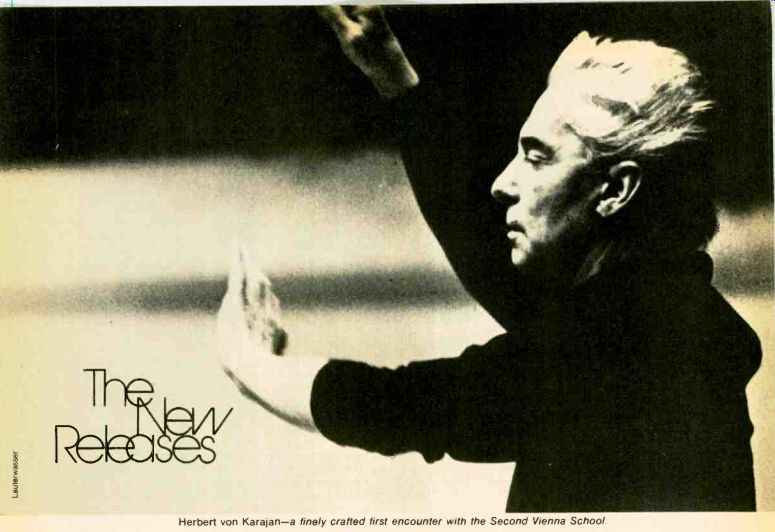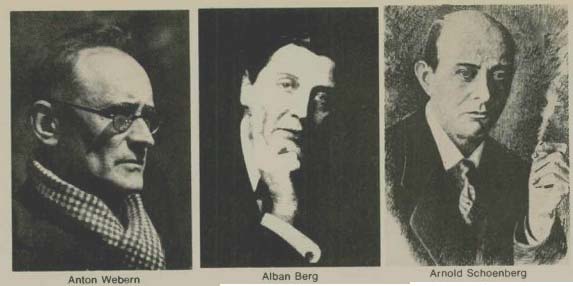
The Second Vienna School Eases into the Repertory
Herbert von Karajan--a finely crafted first encounter Vienna School.
Karajan's four-disc set of works by Schoenberg, Berg, and Webern represents a distinct upgrading of their general level of performance.
by David Hamilton
NEARLY EVERY MONTH now, we confront a significant contribution to the recorded Schoenberg literature a marked contrast to the Ives situation, where the big hurrahs preceded the centennial. Since the Schoen berg anniversary, we have been treated to Gielen's admirable Moses and Aron, the Fires of London's brilliant Pierrot lunaire, and Paul Jacobs' superb traversal of the piano music. Still to come are the Gurre-Lieder and Moses that Boulez recorded in London, the Juilliard Quartet's remake of the quartets (worth waiting for, if the stunning concert performance of Nos. 1 and 3 that I recently heard is a fair sample of what will go on the discs), and perhaps the London Sinfonietta's box of chamber works, containing several previously unrecorded items.
This month's largesse comprises Herbert von Karajan's first recorded encounter with the Second Vienna School: Schoenberg's Pelleas (also available separately as DG 2530 485), Verklarte Nacht, and Orchestral Variations, and a disc each of Berg and Webern. Nearly all of this is valuable, even if it does not make up anything like a "complete" set of these composers' orchestral works-the most obvious omissions being Schoenberg's two Chamber Symphonies and the Op.16 Orchestral Pieces, and Webern's Variations, Op. 30. Karajan and his superior orchestra obviously have much to bring to this music, especially in the realm of precision and polish; with the exception of the late Hans Rosbaud's now unavailable performances (and, in the case of Verklarte Nacht, several others), hardly any recordings of this music have been so finely crafted, have offered so much sheer tonal allure.

---- Anton Webern, Alban Berg, Arnold Schoenberg
This is important. For all that the men of the Second Vienna School are thought of primarily as "brainy" composers, all three had piercingly imaginative ears for orchestral sound. Their music is full of timbral wizardry-much of it devilishly difficult to bring off-involving unconventional playing techniques, extremes of register and dynamics, complex balancing of multiple lines, and asymmetrical, at war-with-the-barline rhythms.
Given this, and the still scanty performance history of the works, it is impossible not to admire what Karajan and the Berlin orchestra have achieved here.
In the case of Schoenberg's Pelleas, one has no reservations at all: The enormously long line of the piece is sustained, the climaxes finely judged, the extraordinary density of texture brilliantly realized. This is a symphonic poem as long as Ein Heldenleben and many times as dense. Here, for once, it sounds like a million dollars: expansive, lush, dramatic, mercurial, and always utterly enthralling to ear and mind. Verklarte Nacht, a much-trodden path, also comes off well-a committed, beautifully played performance, rendered just slightly overripe by the recorded sound's tendency to exaggerate a degree of swoopiness in the string playing.
The Variations are a tougher nut to crack and, for all its virtuosity, this performance doesn't quite convince. Surprisingly, it is not the finale that is problematic, for Karajan keeps a viable momentum going through the numerous tempo changes. Rather, the individual variations sometimes become so self-absorbed that the piece doesn't quite hang together.
Contributory to this may have been the circum stances of recording: In order to achieve optimum balances of these tricky ensembles, each variation was recorded with a special orchestral seating (and, no doubt, microphone setup), yielding some disconcerting Phase-4-ish effects. (For all I know, the separate parts of the finale were also recorded in independently seated takes, but the same problem of line and urgency has not resulted.) Still, this is in many ways the best recording we have of this piece, the twentieth century's answer to Brahms's Haydn Variations; Hans Rosbaud's live-performance version (last seen on Heliodor 2549 008) was more stylish and impulsive but also suffered various minor disasters of execution.
Stylistically, in fact, Schoenberg is the most problematic of these three composers, for he is more Janus-faced than either of his students. Karajan is clearly more comfortable with the still-retrospective aesthetic of Berg (and early Schoenberg) than with that of the Variations or of the later Webern. Given the variables of recorded balance as well as those of execution and interpretation, I am reluctant to as sign a clear first place among the three current recordings of Berg's orchestral pieces (Boulez and Abbado are the other two). All of them score valid points and, after studying them in some detail, I can imagine a recording still better than any of them (or the now-deleted Rosbaud, Craft, and Dorati versions). And the three very difficult transcriptions from the Lyric Suite are strikingly played, if recorded with less than ideal focus; there is at present no other available version, but a Boulez/Philharmonic performance is awaiting release at Columbia.
Boulez must be mentioned in connection with Webern too, for his recordings of all these works have been in the can for some time now. Karajan achieves a particularly powerful effect with the early Passacaglia, but by the time we get to the Op. 21 Symphony he seems at sea: All the notes are there, but none of the music.
A mixed bag, then, but well worth hearing-and at least the single disc of Pelleas is worth hearing often.
These are almost all instructive, thoughtful performances, and you will not fail to be impressed by them, even if you have heard this music many times.
The program booklet includes sketchy notes by H. H. Stuckenschmidt and a biographical note on the conductor, by the same author, that deserves a place of honor in the annals of euphemistic disingenuousness: We read that Karajan's "successes between 1937 and 1945 caused him to be banned for conducting for a time." Just think about that.
SCHOENBERG, BERG, AND WEBERN: Orchestral Works. Berlin Philharmonic Orchestra, Herbert von Karajan, cond. [Hans Weber and Hans Hirsch, prod.]
DEUTSCHE GRAMMOPHON 2711014, $31.92 (four discs, manual sequence).
SCHOENBERG: Pelleas and Melisande. Op. 5 (also available separately on 2530 485): Verklarte Nacht. Op. 4; Variations for Orchestra. Op 31 Beau: Three Orchestral Pieces. Op. 6: Three Pieces from the Lyric Suite. Winans: Passacaglia.
Op. 1: Five Movements. Op. 5 (version for string orchestra). Six Pieces for Orchestra. Op 6; Symphony. Op 21
-------------
( High Fidelity magazine, Jul 1975)
Also see:
Classical--Blegen and Von Stade; Perahia's Mendelssohn Concerto; Baroque bassoon
Re-climbing Everest (remastering recordings of the old Everest label) (Jan. 1990)